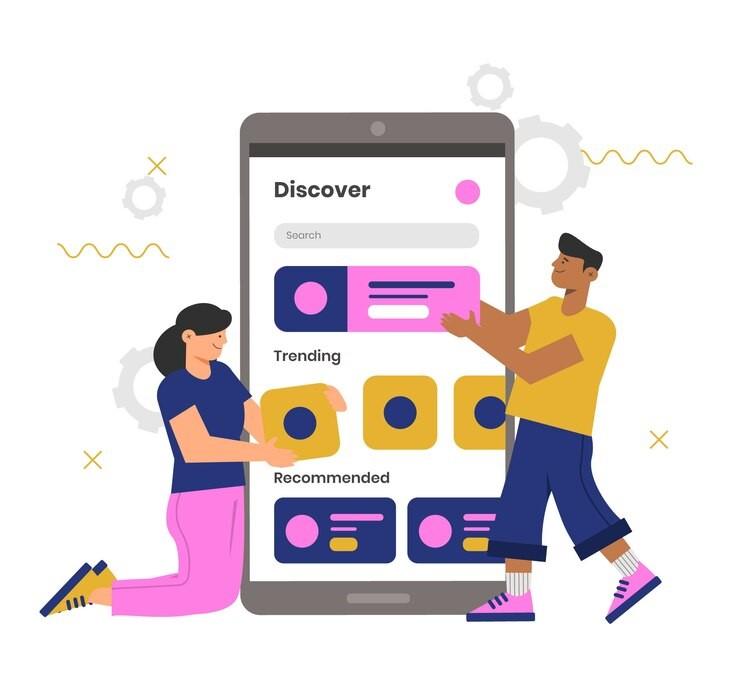How Much Does It Cost to Design a Mobile App?
As a platform for new services, entertainment, and personal management, mobile applications have become vital tools for organizations and individuals alike in the quickly growing digital world. Therefore, there are many things to consider and decisions to make along the road from idea to finished mobile app, and one of the most important is, “How much does it cost to design a mobile app?” Despite first impressions, there is a tangled network of variables that this question reveals that can have a major impact on the total. This article will help you make educated decisions regarding your mobile app design project by exploring these aspects, with a primary focus on Android app development services.
Mobile App Design & Development
Mobile app design and development requires a variety of skills and technologies to produce mobile-specific software. After an idea is conceived, design and development phases provide problems and expenses. Anyone ordering a mobile app must understand the process from idea to launch. In addition to coding, it requires UX and UI design, testing, and maintenance.
Mobile app development has been greatly influenced by platforms like Android, which offer a versatile and widely utilized operating system for a wide range of devices. The democratization of mobile technology has given businesses and developers new opportunities, but it has also changed the cost equation. As we explore this issue, it’s important to remember that mobile app design and development is an investment in a digital product that, if done correctly, may yield high returns.
Factors Affecting the Cost of Mobile App Design
Mobile app design costs depend on several aspects. App complexity is a major factor. Simple apps with limited functionality cost less to build than elaborate ones with real-time synchronization, third-party connections, and fancy animations.
Mobile app design costs vary based on several aspects. These things affect cost:
- App Complexity: The more features and functions your program has, the more it costs. Complex apps with rich features, integrations, or bespoke animations cost more than simple apps.
- IOS, Android, or Both: Development for iOS and Android may cost differently owing to programming languages, design rules, and testing needs. As expected, developing for two platforms increases costs.
- Design needs: UI/UX design, graphical components, animations, and bespoke artwork can increase design complexity and expense. Custom designs for your business and demographic may cost more than templates.
- Screencount and Layouts: More screens and layouts in your app mean more time and work to develop. Design expenses might rise with complex navigation or multi-step processes.
- Third-party service integration: Integration with external services like payment gateways, social media platforms, and APIs can raise development costs owing to additional programming and testing.
- Required Data Storage and Security: Apps that need large-scale data storage, complex security, or GDPR or HIPAA compliance may cost more to design owing to the requirement for specialist knowledge and infrastructure.
- Testing and QA: To ensure app functionality across devices, screen sizes, and operating systems, thorough testing is necessary. Complex apps or those targeting several platforms cost more to test.
- Manage projects and communicate: App development requires good project management and stakeholder, designer, and developer communication. Project management or coordination and communication costs may apply.
- Geolocation of Designers: Design companies and freelance designers in various locations may charge different hourly rates or project expenses depending on the local economy, demand, and experience.
- Extra Services: Maintenance, upgrades, app store optimization, and marketing assistance may cost extra after creation.
These elements should be considered while designing your mobile app project to guarantee your budget meets your needs.
Understanding App Development Service Types
Choosing amongst app development firms is one of the first steps in mobile app creation. These are the primary app development services:
Native App Development:
Native app development uses platform-specific programming languages like Swift or Objective-C for iOS and Java or Kotlin for Android to create apps for one platform. These applications provide excellent performance, complete device functionality, and a seamless user experience, but each platform requires distinct development.
Cross-Platform App Development:
Cross-platform programming lets you build apps for different platforms with one codebase. Unlike native development, React Native, Xamarin, and Flutter allow developers to write code once and distribute it across iOS and Android platforms, saving time and money.
Hybrid App Development:
Native and web apps are combined in hybrid app development. Web technologies like HTML5, CSS, and JavaScript are used to build hybrid apps in native containers. Apache Cordova and Ionic Framework enable hybrid app development, improving code reuse and time to market.
Web app development:
Applications are accessed via a browser without app store installation. Web technologies make them responsive to different screen sizes and devices. While platform-independent and quickly updated, web applications may have restricted device functionalities compared to native or hybrid apps.
Development of custom apps:
Custom app development entails building customized solutions for particular clients or enterprises. Freshly developed apps give full control over features, design, and functioning. They are good for specialized enterprises but demand more effort and resources. For this, you go with the best ios app development services.
UI/UX Design
UI/UX design services provide intuitive and attractive mobile app interfaces. Designers work with clients to understand their brand, target audience, and goals to build wireframes, prototypes, and graphic designs that improve user experience and engagement.
App Support and Maintenance:
Mobile app maintenance and support include updates, bug patches, performance improvements, and technical help to keep them running smoothly. Regular maintenance fixes bugs, boosts security, and adds user-requested functionality.
Consultancy and Strategy:
Consulting and strategy services help define app strategies, target audiences, market research, feature sets, and monetization techniques. Consultants assist clients understand app development and make commercial decisions.
Understanding these app development services helps people and organizations pick the best one for their budget, timetable, target audience, and project needs.
Benefits of Custom Android App Development Services
Custom Android app development services provide several benefits suited to company and individual needs. Some important benefits:
Customized Solutions:
Custom Android app development lets organizations create apps that meet their specific needs, workflows, and difficulties. Custom applications may be personalized to the client’s needs and tastes, giving them a competitive edge.
Scalability:
Scalable custom Android applications allow organizations to grow without rework or rebuilding. Developers may create flexible systems and modular components that can be expanded as the business grows.
A better user experience:
Custom Android apps prioritize user experience, intuitive interfaces, and smooth navigation. Custom apps may boost client happiness, retention, and loyalty by focusing UX and UI design.
Integrating Existing Systems:
Businesses may effortlessly link custom Android apps with their systems, databases, and third-party services. Custom applications may improve processes and efficiency by connecting with ERP, CRM, and payment gateways.
Full function and feature control:
Custom Android app creation gives organizations full control over app features, functionality, and capabilities. Customers may select features based on their company goals and budget to ensure the app fits their needs.
Security, compliance:
Custom Android apps may secure sensitive data and comply with industry requirements with strong security. Developers may protect user data via encryption, authentication, and authorization.
Differentiating brands:
Custom Android applications let companies distinguish out from competition with unique features, branding, and value propositions. A well-designed and branded app may boost brand awareness and client loyalty.
Cost savings over time:
Custom Android app development may cost more upfront than off-the-shelf options, but it may save money and increase ROI. Apps tailored to the company reduce dependency on pricey third-party software licensing or workarounds.
Support and Upkeep:
Support and maintenance are commonly included in custom Android app creation to keep the app functioning, safe, and up-to-date. Developers respond quickly with updates, bug fixes, and technical assistance to improve performance and optimize commercial value.
Custom Android and ios mobile app design and development services strategically construct mobile apps that meet company and individual needs.
How SEO Quartz helps you in Reducing the Cost of Mobile App Design?
SEO Quartz, as a mobile development agency, can help in reducing the cost of mobile app design through various strategies and practices:
Efficient Resource Allocation:
SEO Quartz has a team of experienced designers and developers who can efficiently allocate resources based on project requirements. By optimizing resource utilization and minimizing waste, they can help streamline the design process and reduce unnecessary costs.
Streamlined Communication:
Effective communication between clients and the design team is crucial for avoiding misunderstandings, revisions, and delays that can increase project costs. SEO Quartz facilitates streamlined communication channels and project management tools to ensure clear and efficient collaboration, minimizing the need for costly revisions or rework.
Flexible Engagement Models:
SEO Quartz offers flexible engagement models that allow clients to choose the most suitable pricing structure for their budget and requirements. We offer fixed-price packages, hourly rates, or retainer agreements, giving clients greater control over project costs and enabling them to scale resources as needed.
Use of Templates and Frameworks:
Leveraging pre-designed templates, frameworks, and reusable components can accelerate the design process and reduce development time and costs. SEO Quartz utilizes established design patterns, libraries, and UI/UX kits to expedite the creation of user interfaces and streamline the development workflow without compromising quality.
Focus on Core Features:
We offer an iterative approach to app design, prioritizing the development of core features and functionalities that deliver the most value to users. By focusing on essential features first and deferring non-essential or complex functionalities to later phases, we can minimize upfront costs while still delivering a functional and user-friendly app.
Rapid Prototyping and Testing:
SEO Quartz may emphasize rapid prototyping and user testing to validate design concepts and gather feedback early in the development process. By identifying usability issues, design flaws, or feature gaps at an early stage, we can make necessary adjustments before investing significant time and resources, ultimately reducing overall design costs.
Utilization of Open-Source Tools:
Leveraging open-source design tools, libraries, and frameworks can help minimize licensing fees and reduce development costs. SEO Quartz utilizes open-source software for tasks such as wireframing, prototyping, and graphic design, providing cost-effective alternatives to proprietary tools without sacrificing quality or functionality.
Continuous Improvement:
SEO Quartz prioritizes continuous improvement and optimization throughout the design process, seeking ways to streamline workflows, eliminate inefficiencies, and enhance productivity. By embracing a culture of innovation and learning, we can identify opportunities to reduce costs with our android and react native mobile app development services and deliver greater value to clients over time.
By implementing these strategies and best practices, SEO Quartz can help clients optimize their mobile app design projects, minimize costs, and achieve their business objectives more efficiently.
Conclusion: Is Investing in a Custom Android App Worth It?
In conclusion, the cost of designing a mobile app can vary widely based on numerous factors, including complexity, development approach, and the type of development service chosen. Custom Android app development services, while often more expensive, offer tailored solutions that can provide significant competitive advantages and returns on investment.
For businesses considering a mobile app, it’s essential to carefully evaluate your needs, budget, and the potential benefits of a custom app. With strategic planning and the right development partner, investing in a custom Android app can indeed be worth it.
For more insights into Android app development services and to explore how we can help bring your app idea to life, visit us at SEO Quartz.

